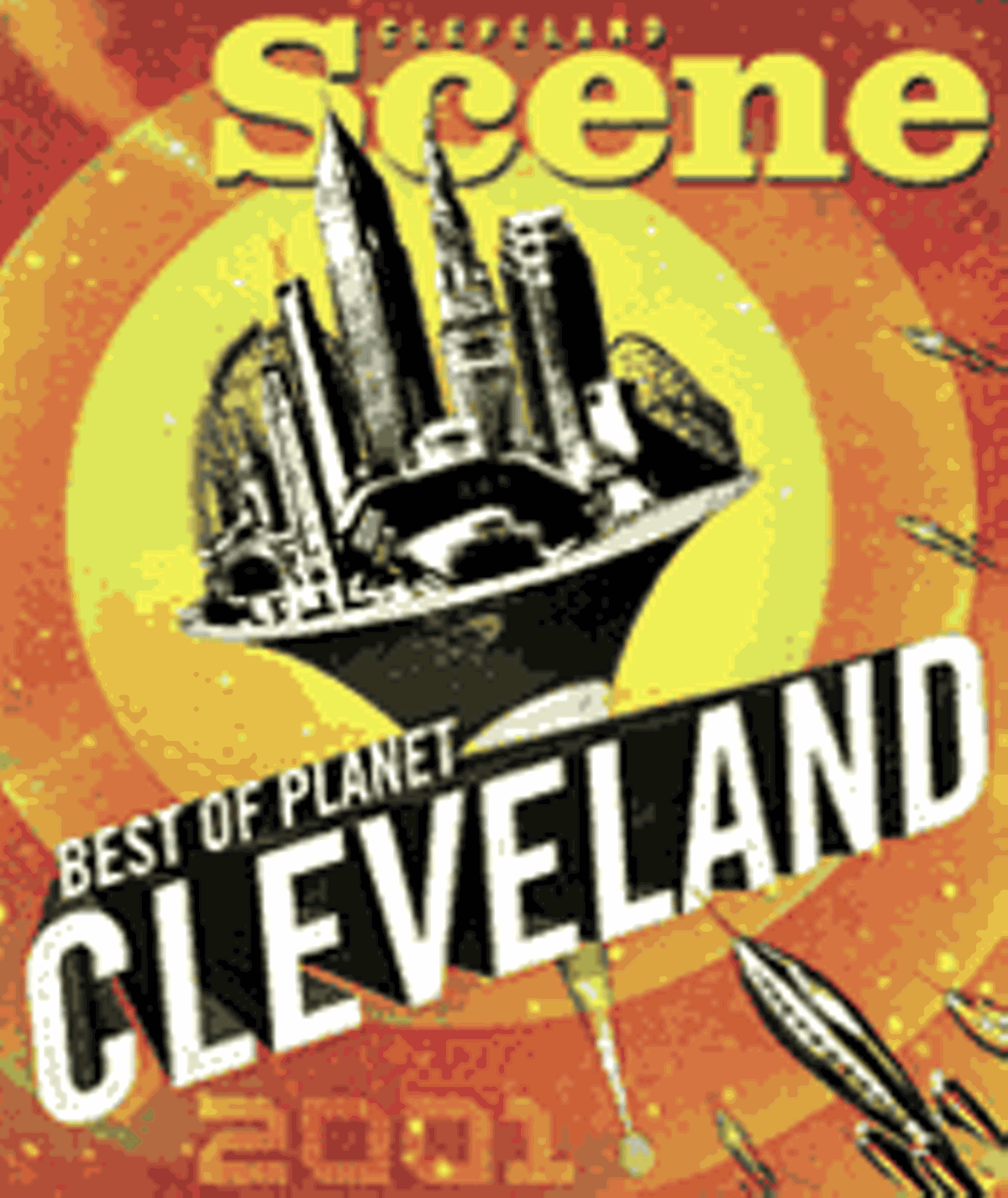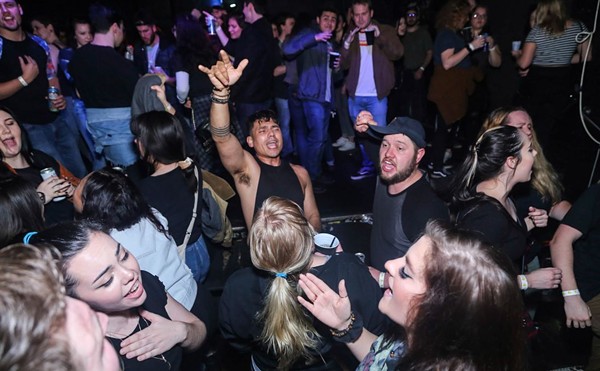Last October, Playhouse Square pulled a coup by being one of only six cities to grab a painfully brief tour of Parade, the most underrated musical of the '90s. With a score by Jason Robert Brown and a book by Driving Miss Daisy's Alfred Uhry, Parade is a musicalization of a sad footnote to American history: Leo Frank, an alienated young Brooklyn Jew running a pencil factory in 1913 Atlanta, is falsely accused of raping and murdering a teenage girl. Musical theater has a propensity for trivializing history. Here, we saw the opposite. Ironically, Parade suffered from jaded critics the same lynching as its murdered hero. As a labor of love, its creators mounted a road company far more assured and vibrant than the Broadway run, and for an all-too-brief couple of weeks, it illuminated for this city the vast possibilities of the American musical.
Inside an old East Cleveland duplex decorated with paintings of crying blue faces and a cross, Albert Wagner, a man with a long gray beard and an eccentric's rambling train of thought, lives with a few family members amid a thousand of his paintings. Roughly rendered, earth-toned faces stare down from every wall, looking stern, worried, sorrowful. A preacher who conducts services in his basement, Wagner reenvisions Old Testament stories, from Adam and Eve, naked and ashamed, to his masterpiece: a huge, beautifully impressionist painting of Moses leading countless Israelites across the parted Red Sea. His work is for sale, and a yellowed sign on the door invites people to come in and look around. Wagner does prefer that people call ahead before they come; good times to stop by are between 9 a.m. and 9 p.m. -- except on Friday night and Saturday, which, Old Testament-style, he considers the true Sabbath.
Picture your living room if someone dropped a bar and a DJ in the middle, and you probably know what to expect at Big Family Lounge. Some of the hottest sound systems in the city bless the speakers with dance-hall reggae fresh off the presses. But be warned: This room is intimate, very close quarters, for that serious dance-hall grind. Dress to impress, but strictly wash and wear. The crowd is all love and well-behaved: nary a gun clap or a bitch slap to be heard . . . most nights. Go with friends, have some drinks, and play "find the restroom." If you ain't got peoples, you will before you leave, nahmean?216-752-6709
As posh as any New York City nightclub, the Asian-themed Funky Buddha is one of the most upscale clubs in the Warehouse District, with its silk-covered couches, antique tables, and velvet drapes. Ambiance isn't all it has going for it, however: Since opening last year, it has hosted DJ Rap, Halo & Justin Long, LTJ Bukem, and Andy Smith, thereby creating a much-needed outlet for national DJ and electronic acts in Cleveland.
Where do you go for good '80s music and a dance floor consistently too packed for dancing? The Velvet Dog, of course, which has become the club of choice for the party-hearty crowd that finds other clubs too pretentious or too overrun with 19-year-olds. With a tiki-lit outdoor patio on the third floor, good martinis, and never enough couches, it's a new twist on a very old, very good theme.
Mick Boogie, formerly of WJCU and now 107.9, has finagled tokenism into a career as one of Cleveland's premier hip-hop DJs. He's booked on black nights uptown, downtown, and in between, exploiting his whiteness and near-talent to attract limp biscuits and hot boys alike. While it's true that Boogie is Cleveland's best DJ, he is a guest in the black community, and he plays as if he's just visiting. If he ever takes it seriously, he could be the best talent ever.
In Porthouse Theater's Big River, a musicalization of Huckleberry Finn, Andrew Tarr, who is in his early 20s, was easily able to call up a huge dose of adolescent sexuality. His Huck was a boy/man perched between the recklessness of youth and the sensitivity of young adulthood. Tarr did a lot more than CliffsNotes to make us understand the peculiar charm and poignancy of literature's great American scamp.
Dan Folino was busy being born when Mandy Patinkin played Che Guevara on Broadway. Folino, in the same role, moves with dangerous grace, exerting the intensity of a song-and-dance Rasputin. If this gifted performer fails to land in the big time, it's further proof of an unjust universe.
The DJs seem to have such pride in their voices when they tell us we're "listening to WRUW-FM/91.1, Cleveland, broadcasting from the campus of Case Western Reserve University." Or maybe the station break has become a mantra for us -- an affirmation that there is a refuge from the commercial stations playing the same few old songs again and again. While huge corporations have made most Cleveland radio sound like radio everywhere else, only worse, the college kids and adult culture junkies on WRUW and the other community stations left of 92 are full of character and amateur charm. While the big stations only know which megastar is coming to Gund or Blossom, WRUW's DJs play songs by the acts coming to the Grog Shop or the Beachland -- and if you go to the show, you might find them standing next to you. WRUW sounds the way radio ought to sound: intimate and personal. And it broadcasts the message radio should send: that our city has more adventure, creativity, and excitement hidden within it than we might think.
You don't have to spend hours in the gym to feel at home at this spacious downtown gay and lesbian club. You just have to forgo that early bedtime. The joint starts jumpin' at about 1 a.m. on Saturdays and stays open as an after-hours club until 4 a.m. Clubgoers travel from as far as Detroit, New York, and Atlanta to hear DJ Robbie Rob's hot and unholy dance mix, which includes hip-hop, R&B, reggae, and four varieties of house -- booty shake, tribal, vocal, and gospel. Line dances abound: There's the cha-cha slide, the Cleveland shuffle, and the "shake what yo' mamma gave ya." The thirtyish, working-class crowd keeps it real and looks good doing it, thanks to the second-floor balcony, where clubgoers can scope out the all-shapes-and-sizes merchandise on the dance floor below.
Beck Center in Lakewood has been turning out shows at the same astonishing rate that Volkswagen turns out Beetles. Just before last Thanksgiving, five giddy, self-proclaimed gay divas donned the wildest feathers and frills, the fruits of six individual costumers. They then commenced to croon, hula, and knock every hoary show-business convention on its tail. The hellzapoppin' conceit of When Pigs Fly is that no self-respecting show queen will heed the advice of his school guidance counselor to forsake the tawdry tinsel of musical theater for the rigors of plumbing. Dean Holt, bearing an uncanny resemblance to the sailor boy on the Cracker Jack box, played Howard Crabtree as a divine teddy bear; director Rob Gibb deliciously straddled the line between deliberate awfulness and counterculture spoofing.
SCENE Supporters make it possible to tell the Cleveland stories you won’t find elsewhere.
Become a supporter today.






